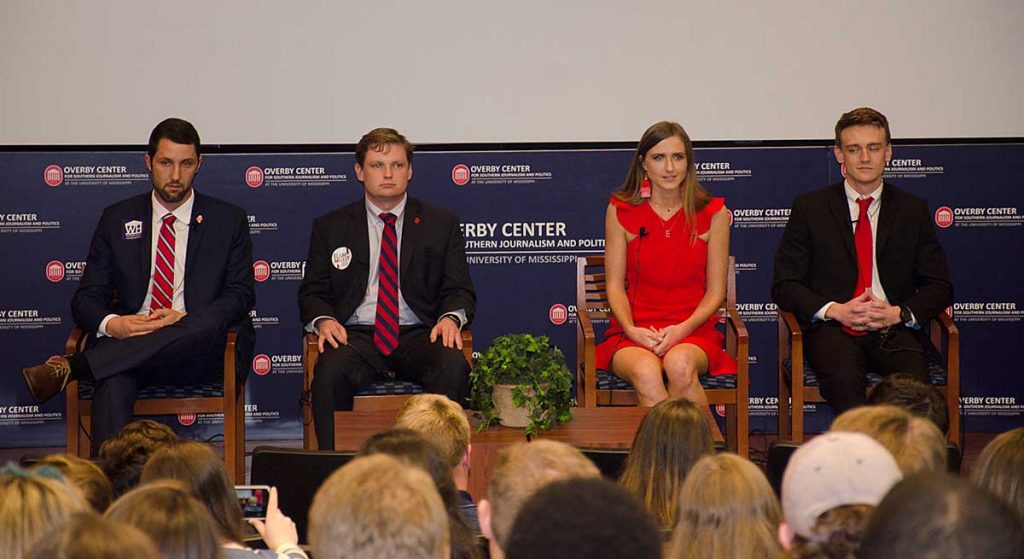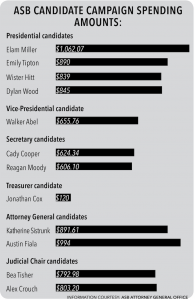The Associated Student Body Senate has voted to lower the campaign spending cap for executive officer candidates and require the publishing of campaign expense vouchers online for the public to see. However, candidates will still not be required to disclose how much money is donated to their campaigns or who donates to their campaigns.
Candidates are required to disclose how much money they spend and what they spend their money on through expense vouchers, but they do not have to disclose where their money comes from.
The only donations candidates must report are non-monetary assets, such as campaign signs or stickers.
During the last ASB election, presidential candidate Emily Tipton self-funded her campaign because she said the current ASB spending cap is “crazy (high)” and doesn’t allow for everyone to compete on a level playing field.
“If you can spend that much money, you will so that you have the most stuff out there,” Tipton said. “And that means that a lot of people … run backed by Greek organizations who can fund them because they have that kind of money backed up specifically for this.”
During the last election cycle, every candidate that ran for an executive officer position was a part of a Greek organization.

FROM LEFT: Wister Hitt, Elam Miller, Emily Tipton and Dylan Wood, running for Associated Student Body president, talk on their platforms during the ASB Candidates Debate on Wednesday. Photo by Hannah Hurdle
The candidates who disclosed that their campaigns received at least partial funding from a Greek organization were presidential candidates Wister Hitt, Elam Miller and Dylan Wood; secretary candidate Cady Cooper; attorney general candidate Katherine Sistrunk; and judicial chair candidates Bea Tisher and Alex Crouch.
Treasurer Jonathan Cox and Vice President Walker Abel (both of whom ran unopposed), presidential candidate Emily Tipton and attorney general candidate Austin Fiala said they self-funded their campaigns

Graphic illustration by: Hayden Benge
ASB secretary candidate Reagan Moody did not respond to questions about her campaign funding.
Interfraternity President Bennet Wilfong said Greek organizations are private organizations that don’t have to disclose where their money goes.
“The money can come from chapter sponsors or individual donations,” Wilfong said. “I am not the one who has the power to force Greek organizations to disclose where their money goes.”
College Panhellenic President Ann Weston Sistrunk echoed Wilfong’s sentiment and added that chapter discretion determines how chapters fund members of their organizations.
“The College Panhellenic Council does not have any role in funding candidates for ASB campaigns,” Ann Weston Sistrunk said. “This would be something to ask each chapter individually, as they are the ones who fund campaigns internally. I have no knowledge of how the ASB campaign funding works at all.”
Outgoing attorney general, Dillon Pitts, confirmed that there are no forms to track where the candidates’ campaign funds come from but that Ole Miss has one of the “lowest limits in the (SEC) in comparison to other schools.”
According to the codes and constitutions of other SEC universities, Ole Miss does have one of the lowest spending caps in the SEC with caps of $1,500 for presidential and vice presidential candidates, $1,000 for other executive officer candidates and $300 for senate candidates.
If the university administration approves Senate Bill 18-5, Ole Miss will be tied with University of Alabama for the lowest SEC campaign spending cap for executive officer candidates at $1,000 and will have a cap of $200 for senators, which is one-fourth the amount of money non-executive candidates at Alabama may spend.
The University of Missouri’s constitution does not have any restrictions on campaign spending caps for its student government candidates. However, it does require that students list who their donors are and how much money is donated to them.
Other universities that require student government candidates to list both their donors’ identities and the amount of money received are the University of Georgia and the University of Arkansas. Louisiana State University doesn’t allow student government candidates to receive any money to fund their campaigns. No data was found for the University of Vanderbilt and the University of Florida.
“I would definitely be open to releasing these expenses to the public,” Katherine Sistrunk said. “I think this is something important, that students should know where … and who candidates are funded by. That is something, I believe, shouldn’t be hidden — not that it’s trying to be hidden.”






